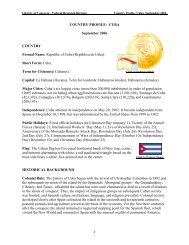1 - American Memory
1 - American Memory
1 - American Memory
You also want an ePaper? Increase the reach of your titles
YUMPU automatically turns print PDFs into web optimized ePapers that Google loves.
232<br />
The Governor wishes to express his appreciation to the Committee on behalf<br />
of the people of Guam for the consideration which it gives these views.<br />
Submitted on behalf of the Governor of Guam by :<br />
EuoKXE L. STEWART, Esq.,<br />
Special Counsel for the Qovemor of Ouatn.<br />
STATEMENT OF ROBEBT E. GBUNSKY, PBESIDENT, HAWAII<br />
EMPLOTEBS COUNCIL<br />
My name Is Robert R. Grunsky and I am president of the Hawaii Employers<br />
Council. The Council Is made up of 650 members in Hawaii and the Territory of<br />
Guam covering the entire spectrum of business activity in these Islands. The<br />
Council provides the forum for Industry in industrial relations matters. This<br />
statement is submitted on behalf of the Council members.<br />
The Council strongly endorses and supports H.R. 7189 and urges its passage<br />
by the Congress of the United States.<br />
We have testified during the hearings of the Senate Merchant Marine Sub-<br />
committee held in Honolulu on January 19, 1972, on the Impact of shipping<br />
strilces on business, costs, and on employee layofTs. Therefore, we do not Intend<br />
to present testimony at this hearing on the need for protection for Hawaii and<br />
Guam from the crippling effects of shipping strikes, but request that our testi-<br />
mony before the Senate Merchant Marine Subcommittee, referred to above and<br />
attached hereto, be incorporated as part of our testimony In support of H.R. 7189.<br />
We also endorse and support the evidence of the need for legislative relief set<br />
forth in the booklet put out by the research department of the First Hawaiian<br />
Bank entitled, "Hawaii, the Most Vulnerable State In the Union."<br />
The Council in its position as a labor relations expert representing employers<br />
In collective bargaining will confine its testimony to the questions:<br />
(1) Will H.R. 7189 create undue interference with collective bargaining rights<br />
of the parties?<br />
(2) Is H.R. 7189 anti-union legislation?<br />
Admittedly, we are not one of the parties directly affected by this proposed<br />
bill so our testimony can only be viewed as expert opinion. We do, however, deal<br />
with one of the major unions, the ILWU, for the stevedoring operations In<br />
Hawaii. Any time some employees are working or some employers are not shut<br />
down by a strike, there is an impact at the negotiating table and some stresses<br />
occur on both parties.<br />
The question Is would this create undue interference with the collective bar-<br />
gaining rights of the parties or unduly Impede or block the collective bargaining<br />
process or the right to strike. We contend It would not.<br />
Only 3%' of the total longshore man-hours in West Coast ports are devoted<br />
to handling commodities bound to or from Hawaii. Of the total man-days worked<br />
by seagoing personnel on U.S. flagships out of West Coast ports, only 7.8% ' are<br />
worked in the Hawaii trade.<br />
It should be noted that In the recent 1971-72 longshore strike and generally<br />
in all previous shipping strikes, the parties have continued to supply military<br />
cargo to Hawaii and Guam. This has been a substantial amount of freight, so<br />
the actual impact of H.R. 7189 on the collective bargaining situation Is much<br />
less than the 3% of longshore man-hours and 7.8% of seagoing man-days be-<br />
cause of the past practice of continuing shipments of military cargo.<br />
If a shipping .strike .situation affecting Hawaii or Guam should develop during<br />
time of peace, a very sensitive situation could develop between the civilian com-<br />
munity and the military should the union grant any special favors of supply to<br />
the military. H.R. 7189 would practically eliminate this problem.<br />
There can be no question that this is a de minimis situation as far as impact<br />
on negotiations between the employers and the unions on the West Coast is<br />
concerned. We, therefore, content that H.R. 7189 in no way creates any undue<br />
Interference with the collective bargaining rights of the parties because:<br />
(1) Hawaii and Guam shipping traffic is de minimis In terms of over-all West<br />
Coast shipping traffic.<br />
(2) The 160-day strike exemption would merely constitute an extension of the<br />
historical practice of continuing freight service during strikes to the military of<br />
Hawaii and Guam in time of war.<br />
(3) "Partial operations" which this bill provides Is an alternative onder the<br />
present Taft-Hartley emergency strike procedures.<br />
^ See page 3S of "Hawaii, the Host Valnerable State In the TInlon," by First ECawmllaa<br />
Bank, Honolulu, Hawaii.



![Albert Einstein Papers [finding aid]. Library of Congress. [PDF ...](https://img.yumpu.com/21604228/1/190x245/albert-einstein-papers-finding-aid-library-of-congress-pdf-.jpg?quality=85)





![American Colony in Jerusalem Collection [finding aid]. Library of ...](https://img.yumpu.com/17941275/1/190x245/american-colony-in-jerusalem-collection-finding-aid-library-of-.jpg?quality=85)



![Piccard Family Papers [finding aid]. - American Memory - Library of ...](https://img.yumpu.com/17941234/1/190x245/piccard-family-papers-finding-aid-american-memory-library-of-.jpg?quality=85)


